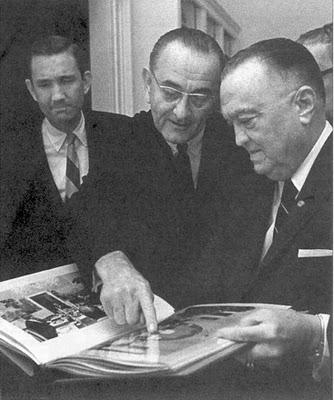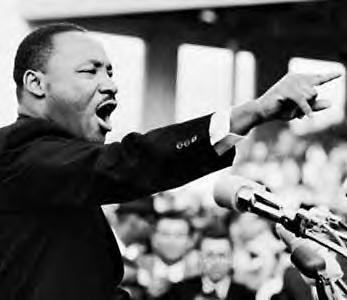
J. Edgar Hoover (right) with President Lyndon B. Johnson.
I worked for Mr. Hoover and the FBI in Washington, D.C. as a clerk from 1957-1962; Miami Field Office, 1962 - 1968 (Technical Surveillance Clerk in the Organized Crime Program); as a Special Agent, Oklahoma City Field Office 1968-1969, Baltimore Field Office 1969-1981 (also as a Supervisory Special Agent on the criminal side of the house, and the division Media Rep (PIO); at FBI Headquarters (HQ) as a national spokesman; and as Chief of the FBI-HQ Press Office 1986-1988 when I retired. Since 1990, I have been a Special Investigator under contract to the FBI (background investigations).During my HQ days as a clerk and as an agent, I met many of Mr. Hoover's early officials. I also did considerable research on Mr. Hoover's stewardship of the FBI. As a senior tour leader at FBI-HQ and because I had prior military experience, I was assigned by Mr. DeLoach to assist (driving, etc) various journalists covering the FBI.
My exceptions/additions to your article ("5 Myth about J Edgar Hoover") are these:
Intimidating Officials
1. There is absolutely no evidence that Mr. Hoover blackmailed or attempted to intimidate any officials. Conversely, Mr. Hoover had an excellent relationship with most of the congressional committee chairmen. He knew how to keep Congress happy, which was essential to getting his budgets approved. These chairmen knew exactly what the FBI was doing in those days. Unfortunately, much of their dialog is not in the public domain,
Civil Rights
2. Having been the clerical complaint clerk (first point of contact with FBI for citizens referring non-emergency matters) in the Miami Field Office 1966-1968 (when President Johnson shut down our wiretap/eavesdropping program which was administered according to existing law at that time), I was well briefed on the FBI's response to civil rights matters. These were given the highest priority of the time (2 weeks for a full-field investigation). At that time, the FBI was making great headway in discreetly and overtly investigating and neutralizing the KKK and other radical groups according to the law at that time.
Much of the criticism toward Mr. Hoover's civil rights policy stemmed from a response memo from Mr. Hoover to a member of Congress inquiring about Mr. Hoover's views on expanding the jurisdiction of the FBI. (This memo, as I recall, was written in the late 40's). Mr. Hoover honestly responded that by increasing the FBI's jurisdiction in the area of civil rights, the ability of the FBI to investigate other priorities ESTABLISHED BY CONGRESS, including the investigation/recovery of stolen motor vehicles, a very important matter to representatives from auto manufacturing states, would be greatly diminished. That memo has been held against Mr. Hoover by certain journalists since the 70's.
It was alleged that Mr. Hoover was dragged kicking and screaming into the CR arena. Mr. Hoover, I'm told, was generally against the expansion of Federal powers/jurisdiction. Don't forget, too, it was the FBI under Mr. Hoover that solved the murders of the three civil rights workers in Mississippi, etc., etc,
Dr. King
3. Mr. Hoover was not investigating the civil rights movement or its leaders in the 1960s. There was a legitimate investigation of the CPUSA (Communist Party USA) that led us to Dr. King. The CPUSA was allegedly attempting to exploit the civil rights movement. It was Robert Kennedy who authorized the wiretaps of MLK,
Public Relations

Dr. Martin Luther King speaking in the mid-1960s.
4. Mr. Hoover knew the value of and had an effective public affairs apparatus. It was not designed to enhance his reputation, it was intended to engender public respect for and encourage public cooperation with the FBI - period. Mr. Hoover knew that public cooperation was essential to getting the FBI mission accomplished.
I am not saying Mr. Hoover was perfect, who is? But, as a loyal and patriotic American who turned a corrupt and inefficient agency into the premier law agency in the world - he deserves an honorable place in history. I am also amused that Mr. Hoover's detractors came out of the woodwork only after his death when he was unable to defend himself, following a distinguished career of doing exactly what Congress and the various administrations hired him to do.
Again, thanks for a very good article. Respectfully, Lane Bonner, Jr., Plant City, Florida.

